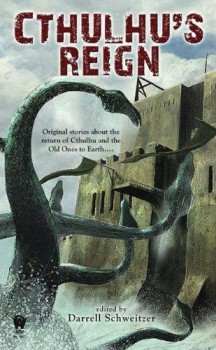Chris Braak Reviews Cthulhu’s Reign
 Cthulhu’s Reign
Cthulhu’s Reign
Darrell Schweitzer, ed.
DAW (308 pp, $7.99, 2010)
Reviewed by Chris Braak
It is unquestionably a challenge to create a sense of drama in a set of stories that all share the premise of “human civilization has been destroyed by invincible monster-gods from space.” Cthulhu’s Reign is an anthology that sets out to do just that, using the theme of H. P. Lovecraft’s Old Ones – most often Cthulhu and his star-spawn, but not always – returning to prominence on earth after countless millennia of death/sleep. All of the book’s fifteen authors are to be commended for their imaginative takes on just what that return might look like, but there are some problems with the anthology as a whole.
The first and primary issue is that it’s just unrelentingly depressing. One story about the end of humanity out of a collection of fifteen is one thing; but a book in which every single story ends on a note of complete and utter hopelessness is exhausting. There is no reason to blame the authors; they are each separately and privately fulfilling their mandate. The problem is with the idea of the theme itself, which might be charitably described as “too much of a good thing.”
The second major issue is one that Lovecraft’s own writings should have revealed: Lovecraft never did anything more than hint at the terrific holocaust that was the return of the Outer Gods; to actually see it, and to see people participating and being affected by it, is to sap it of the existential dread that infused the late master’s work. The authors, commendable imaginations aside, are stuck with the fact that once the world has been reclaimed by Cthulhu et al, there is not really anywhere for the story to go. No dreadful implications, no hints of a dark and terrible future; Cthulhu as the new regent of earth is basically as terrible as it gets.
This isn’t to say that none of the collected authors succeeds in creating drama, or capturing the eerie horror endemic to Lovecraft’s works: it’s rather an explanation of the two major stumbling blocks that the anthology suffers from in general. Some of the authors do succeed, despite these hurdles, in pretty enjoyable ways.
In particular: Will Murray’s “What Brings the Void” is a taut piece, about a government-trained psychic trying to understand what is happening to the world in the early stages of Armageddon. It suffers from a little melodrama towards the end, but Murray does a decent job of keeping the mystery alive.
“The New Pauline Corpus,” by Matt Cardin, is an extremely interesting premise – taking as its subject a new religious text that reinterprets the famous Necronomicon as a kind of Christian midrash. It is less interesting in practice – or, about precisely as interesting as a Lovecraftian short-story in the form of theological criticism ought to be, but Cardin definitely gets points for effort.
Jay Lake’s “Such Bright Risen Madness in Our Names” is a nice little gem of a story – indulging in the requisite weirdness and horror of a Lovecraftian future, but, by setting the piece among a kind of human (or half-human, half-Deep One) resistance, Lake manages to inject just enough hope into the proceedings to make it a compelling page-turner. Even if – perhaps especially if – we never find out precisely whether or not that hope is justified, the question actually serves to immensely sharpen the dread.
“The Seals of New R’lyeh,” by Gregory Frost, is a piece about two unrepentant thieves, trying to make their way in the apocalyptic future, and, possibly, stumbling on a way to undo Cthulhu’s arrival. It also takes some unnecessary, but still wickedly funny, potshots at a certain well-known television pundit; whether or not the reader enjoys that is probably a question of personal preference.
Brian Stableford’s “The Holocaust of Ecstasy” definitely enjoys the “weirdest of all” position (though it’s a close race with Laird Barron’s) on the list. A biologist who discovers that he has been reincarnated into a kind of alien orchard in the future is an unlikely but surprisingly effective viewpoint character with which to explore the ultimately incomprehensible Cthulhoid future.
“Vastation,” by Laird Barron, also brings the weirdness, which is also the author’s signature style. It is a surreal trip through…what just may be the mind of a schizophrenic? Possibly someone who really has managed to unstick himself from time and his conflicts with himself and with the servitors of the Old Ones along his tangled personal timeline.
Finally, the longest piece of the collection, “Remnants,” by Fred Chappell, also takes as its subjects the last, benighted survivors of the Cthulhu Apocalypse, but manages to overlay an interesting examination of human consciousness into the story. Of all the pieces, “Remnants” has the most in-depth character development, the strongest, and possibly best, balance between the inescapable horror of the Outer Gods and the need for a story like this to actually offer some kind of hope in order to be dramatically interesting.
All in all, despite the restrictions to compelling, non-soul-crushing storytelling that the theme imposes, all of the authors bring vivid imagination to the illustration of mind-blowing horrors, and there is some truly standout work presented here.
__________
This review originally appeared in Black Gate 15
Chris Braak is a novelist and playwright from Philadelphia, Pennsylvania. His most recent books, The Translated Man and Other Stories and Mr. Stitch, are available at Threat Quality Press. You can find out more about Chris at the Chris Braak Website Experience (www.chrisbraak.com).